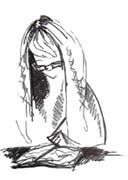 I wasn't aware that one author could win the Booker Prize twice, but apparently it can be done, because J.M. Coetzee's done it. If you couple that with a Nobel Prize in Literature, I'd say you've got some pretty impressive credentials. At what point does award-winning become excessive, I wonder?
I wasn't aware that one author could win the Booker Prize twice, but apparently it can be done, because J.M. Coetzee's done it. If you couple that with a Nobel Prize in Literature, I'd say you've got some pretty impressive credentials. At what point does award-winning become excessive, I wonder?ELIZABETH COSTELLO is one of Coetzee's more recent novels and it is a complicated book, structured in a series of formal addresses given by various characters on various subjects--each of the eight chapters is complete in itself, bracketed by narrative, but centered around an issue like animal rights, "the problem of evil", and so on.
This format is interesting for several reasons, not least of which is the fact that it leaves the reader to make her own decisions about each topic, as each lecture is received dubiously by its audience and critique is offered on each subject, by the characters speaking or by their audience, so that the author's bias and opinion are not readily divined. This gives the book an unsettling murkiness, and made me think a bit more than I cared to, in all honesty. I cannot even pretend that I understood half of what was being discussed.
Coetzee's writing is deliberate and powerful, and for this I loved the first two chapters, and the second to last, "The Gate," all of which relied more heavily on story than on lecture. As much as I loved the rhthym of Coetzee's voice, and however fascinating the ideas being presented, I found myself tempted to skip ahead through many pages of discussion to where the narrative thread picked up again.
Another dubiously good Coetzee book? Disgrace. Both are worth reading, though I could sum each one up in a single word: for Disgrace, I choose "depressing." For ELIZABETH COSTELLO, "intimidating." But don't let that scare you away.
RATING: 3

No comments:
Post a Comment